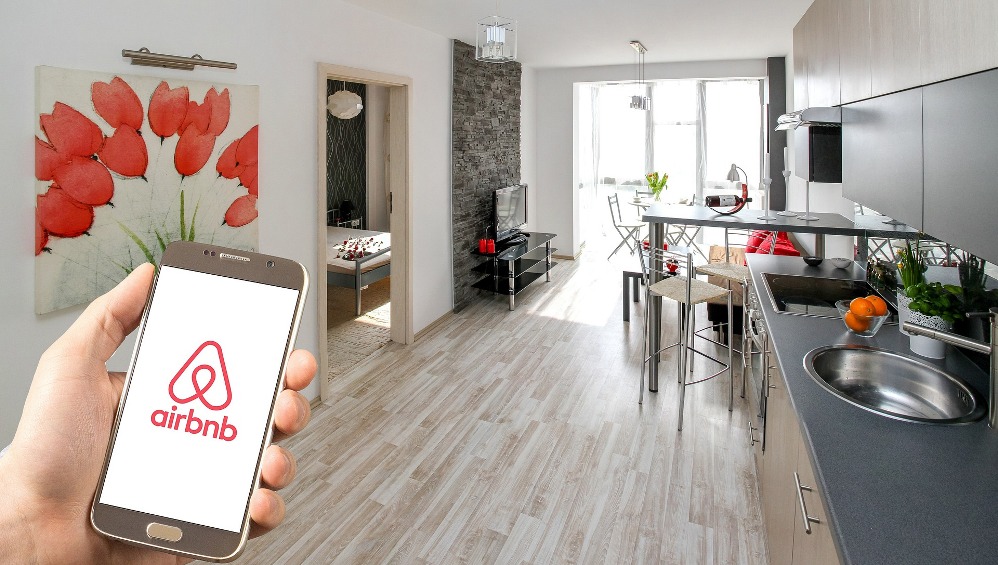The New Improved Hospitality Business – Airbnb
Airbnb has experienced some seriously explosive growth since three struggling tech guys rented out their San Francisco apartment during a convention. JerseyMan asked me to tell their fascinating tale and explain how Airbnb became so successful for the Spring 2017 issue. You can view the PDF of the article here.

Yes, with just your phone, you can rent a sweet place like this.
(photo courtesy of FOTOGRAFIN on Pixabay.)
The New + Improved Hospitality Business
Airbnb has made it possible for millions of travelers to stay in residents’ homes all over the globe…and help residents pay the rent.
I reside in Turnersville, NJ, a middle class suburb whose biggest attraction is an auto mall. It’s not exactly a bucket list destination. No one I know takes a vacation to buy a car.
So you can imagine my surprise upon learning that even Turnersville city slickers could earn a few bucks towards the mortgage…just by letting travelers use a spare bedroom.
See, the town actually has something going for it, aside from multi-gigawatt illumination of car dealership lots. It’s a short drive from the city where this nation was born, millions of tourists visit that city, and hotels are expensive and boring.
All a Turnersvillian needs to do is overcome the uneasiness of strangers staying in their home. Easier said than done, perhaps. And that trepidation works both ways. How many people would spend a vacation in the home of someone they’ve never met?
That might sound like a rhetorical question, if the answer wasn’t 60 million. That’s how many guests have used Airbnb.com for their travel lodging since the site’s debut in 2008.
Here’s some exponential growth: Airbnb celebrated its millionth booking in February 2011. Less than a year later, in January 2012, that number reached 5 million. That June they passed 10 million. There might be some calculus-related phenomenon for that line on a graph, but there’s little question that Airbnb has demolished the trust barrier.
The business model is simple enough. Travelers choose from sometimes thousands of residences to rent at their destination, often at far more reasonable rates than local hotels. Hosts can offer the use of a room or their entire home, including the refrigerator and stove, homemade breakfast, free parking, whatever makes the sale.
Both parties benefit. The guest has a greater variety of affordable lodging choices, and the host makes a few dollars to pay bills…no small thing in tourist destinations where the cost of living can be abominably high.
Airbnb’s cut…3% from the host and 6-12% from the guest for each booking…keeps the company going substantially well. With 60 million bookings, that 9-15% works out to…carry the exponent symbol…a boatload of money. (If you want the real number, Airbnb was recently valued at about $30 billion.)
It all started with a couple of young dreamers needing to pay rent. And several air mattresses.
It’s doubtful he planned it that way, but one of Airbnb CEO Brian Chesky’s entrepreneurial lessons is this, which he shared in an interview with Gigaom: “Being broke brings an incredible amount of discipline and focus.”
Chesky and his friend Joe Gebbia, now the CPO of Airbnb…and like Chesky, is now wealthy enough to buy the Yankees…moved to San Francisco in 2007 to create their startup, with no jobs, ideas or money.
That turned out to be key component of a savvy business plan.
Just as the rent was coming due, San Francisco hosted a tech convention that caused all the hotel rooms to be booked. To pay their landlord, the two offered a stay in their apartment on air mattresses, which attracted three paying visitors. You can almost hear the ding of the bulb switching on. Airbedandbreakfast.com was born.
It wasn’t always smooth sailing. Finding investors was difficult enough until they managed to win over Paul Graham at Y Combinator.
When Chesky and Gebbia, and their friend and tech expert Nathan Blecharczyk, needed to fund an eBay-style couchsurfing idea, Graham initially balked for obvious reasons. But he changed his tune when he saw the Obama O’s and Cap’n McCain cereal boxes that the young executives had designed and sold during the 2008 election. Graham was so impressed he even tried unsuccessfully to persuade his VC friends to buy in just on the basis of their drive.
Graham advised the founders…and funded the trip…to visit hosts in New York, where Airbnb had become a popular alternative to astronomical hotel rates. Chesky and Gebbia spoke face-to-face with hosts about their needs.
Ever since then Airbnb has striven to better the user experience in every way, from sending a professional photographer to hosts’ homes (a service Airbnb offers at no extra charge), to allowing users to sign up using Facebook accounts and simplifying the payment process. Airbnb requires verifiable information like phone numbers, and guests and hosts can publicly rate each other.
The timing didn’t hurt. The way had been somewhat paved: by the time Airbnb came along, eBay and Craigslist had already taken advantage of the Internet to make classifieds obsolete.
If eBay’s success has taught us anything, it’s that most of us are decent people who instinctively know that theft and assault is wrong. That’s why exceptions make the news. In the age of Facebook, it’s a great deal easier to learn enough about someone to feel comfortable riding in their car or even buying a car from them. For every story of fake Super Bowl tickets sold on Craigslist, there are a million stories of satisfied users who got something they wanted at a great price or made a profit selling something they no longer use.
It’s called the “sharing economy”, and given the meteoric rise of eBay, Uber and now Airbnb, apparently we’re comfortable with the odds. Airbnb users often gush that transactions often result in friendships and great experiences for travelers and hosts.
That’s not to say there haven’t been some nightmares.
The most notable story is of the Bay Area woman whose home was ransacked by a guest in 2011. She lost cash and valuables, and other items were burned in her fireplace with the flue closed. She was traumatized enough to start an anonymous blog, documenting Airbnb’s failure to address the devastation. It took some bad press, but Airbnb did apologize publicly and profusely and took steps to improve safety, including a damage guarantee for hosts that is now $1 million.
There was also the terrifying ordeal of a 19-year-old man staying in Madrid with a transgender man living as a woman, who locked him in the apartment and refused to let him out until he submitted to a sexual act. The story appeared in the New York Times, describing Airbnb’s arguably insufficient efforts to stop the assault. Airbnb quickly publicized that they would be instructing employees to call the police if they believed a crime was imminent. The victim advised Airbnb users to take precautions, like making the host’s address available to family members.
Those aren’t the only stories of bad actors, but that such tales are rare among millions of stays is pretty impressive. It’s not enough to give too much pause, obviously. But Airbnb also has legal issues to contend with these days.
The hotel industry isn’t happy about Airbnb cutting into their business. They might have a legitimate gripe. Part of the expense of running a hotel is following cleanliness and safety statutes that an Airbnb host doesn’t usually need to observe.
When you think about it, the stay on air mattresses that was the inspiration for Airbnb could arguably have been illegal. Zoning laws in many municipalities prohibit businesses to operate in residential areas, and running a hotel from home might qualify.
San Francisco had been one of the more stringent cities about such laws, even placing eviction notices on the doors of quite a few hosts. New York City, with almost 30,000 Airbnb hosts, has also taken issue with the service, citing a 2010 law that disallows apartment rentals for under 29 days. Lawmakers insisted it wasn’t targeted at Airbnb, but they did fine one host $7,000, a total eventually reduced to $2,400.
San Francisco eventually reconfigured the laws to make hosting legal, once Airbnb agreed to have hosts pay the 14% hotel tax. See, governments can be reasonable.
But the Big Apple continues to be a thorn in Airbnb’s side, recently passing legislation–signed by Governor Cuomo–that imposes stiff fines on property owners who don’t follow housing regulations while renting their homes. Politicians frequently used hot button words like “threat to affordable housing” in their support of the bill; Airbnb angrily accused them of protecting the hotel industry.
Now that they can, Airbnb has armed themselves with a strong legal team of their own, to fight the NYC battles and other regional disruptions that will likely keep ensuing.
As Gebbia was quoted in Inc. magazine, “The car had incredible opponents from the carriage industry. It would have been a big ask to get people to understand them overnight. But their value was proved over time.”
It hasn’t taken long. Every couple of seconds or so, a booking happens on Airbnb, and that interval keeps shrinking as the reputation for trust grows with each successful stay. Occasional ugly experiences and regulatory battles won’t likely stop the juggernaut.
Once one gets past the trust barrier, they’re getting the same deal as in any hotel…a room with a bed and a TV. Perhaps the most appealing part of all is lodging with a true local who…for business purposes…wants you to have a great stay. Unlike a concierge reading from a typewritten list of restaurants, a resident will actually know where to find the best Italian food or ideal parking spot.
Or where to buy a car.
Did this post make your day a little bit?
I hope so. If it did, I would really appreciate your support.
When you use this link to shop on Amazon, you’ll help subsidize this great website…at no extra charge to you.
Thanks very much…come back soon!
Being A “Superhost”
If you get enough positive feedback from visitors to your abode, Airbnb may make you a “Superhost” … the equivalent of an A+ rating from the Better Business Bureau.
According to Airbnb’s website, to become a “Superhost”, you have to, in one year, host at least 10 trips, maintain a 90% response rate, and receive a five-star review from at least 80% of the travelers who use your place. You don’t have to apply for the badge, they will give it to you automatically.
On the website, Airbnb lists some examples of Superhosts and what makes them stand out. One couple in Sydney, Australia put off the sale of their home rather than cancel a booking that they had made; a woman in Rome, Italy always invites her guests to join her and her friends for meals or conversation. Airbnb points out what makes a Superhost: going the extra mile and doing things one wishes hotels would do.
The Superhost gets a shiny badge on their listing showing their status, and there are some other perks too…like a $100 travel coupon for maintaining your status, priority support, and exclusive invitations to product releases and events.
Best of all, potential guests can filter their search to have only Superhosts show up in the results. Kind of like filtering only one-star reviews of a product on Amazon.
“You’re Staying Where?”
Admit it, you’ve probably never stayed overnight in an igloo before. But that’s the beauty of Airbnb…a different style of lodging. But an igloo, you ask? Yes, and check out some of the types of residences that are currently listed on Airbnb:
Igloo – You can stay inside of an igloo by a lake in Norway for $181 a night; the listing says that it can sleep 2-3 people and to bring your sleeping bag. It doesn’t have any reviews, so apparently, the igloo thing hasn’t caught on yet. Airbnb removed a Brooklyn igloo listing in 2016, saying it didn’t meet the occupancy standards. Someone will get it right.
Castle – On the other hand, castles are pretty big on Airbnb…an article on the Conde Nast traveler site listed 11 of them, with stunning photos and equally stunning prices. The Castello Dal Pozzo in Piedmont, Italy goes for $4,029 a night, and the Martello Tower in Dalkey, Ireland brings in $518 a night. If you search for “Airbnb castles”, you can see top 20 listings in France and Ireland alone.
Tree House – Thrillist recently published an article listing the “25 Coolest Treehouses on Airbnb”. #1 is in Atlanta…it’s three separate rooms connected by a rope bridge and goes for $375 a night. Airbnb says it’s the “most wished for listing in 2016”. Others include a luxury treehouse on the Bayou in Baton Rouge, a Bay Area treehouse with a wraparound porch and food delivery, and a treehouse in Swallowtail studios “with 360-degree views of surrounding vineyards. The nice thing is that they all have stairways.
An Airplane – Airbnb was the site for a contest to win a stay in a KLM Royal Dutch Airlines airplane…the plane had been retired from service and furnished with a living room, bedrooms and two kitchens. There were some comical rules to follow, like “No Smoking when the non-smoking sign is on”, and “No marshmallow roasting with the jet engines”.
They offered movies with your stay too…one of them…no, I’m not making this up…was “Snakes On A Plane”.
Eating Your Own Dog Food
Brian Chesky isn’t just the co-owner of Airbnb, he’s also a client.
In 2010 Chesky decided to finally move out of the San Francisco apartment that housed the first Airbnb travelers. To a new mansion? Nope. He spent several years staying with Airbnb hosts in San Francisco and elsewhere.
As he said on Twitter, “I am still homeless (most of the time), and living on Airbnb.”
In other words, Chesky is so dedicated to his craft that he lives it; he stays with Airbnb hosts every night and continues to do what he and Gebbia did in New York City at the start; stay with hosts and learn from them how to improve the experience. In entrepreneur-speak, it’s called “eating your own dog food”.
After all, why buy a house you won’t be in most of the time? Chesky has pointed out that the sharing economy was all about avoiding buying something you won’t use. The average power drill, he is quoted in Traveller as saying, gets used a total of 13 minutes in its lifetime, but there are 80 million of them out there.
Chesky still lists the San Francisco apartment as his primary residence…and incidentally, as recently as 2015 you could still book a $50 stay on the couch.
Missing The Boat
Another of Airbnb CEO Brian Chesky’s tenets for entrepreneurs is “conventional wisdom is overrated”.
Venture capitalists know this better than anyone…they all know the stories of products that no one believed would sell, like the Beatles, bottled water, or a Donald Trump presidency. But you can imagine that even they might balk at the idea of a website that enables people to rent out rooms to strangers for a night. At least until they see how dedicated to overcoming that mistrust barrier these entrepreneurs really were.
Paul Graham saw that…his friend Fred Wilson didn’t. Despite repeated e-mails from Graham pleading with Wilson to at least meet with the Airbnb guys, Wilson reluctantly balked at an investment…the proverbial definition of missing the boat. To Wilson’s great credit, he published his mistake on his blog.
According to Wilson, his mistake was focusing on the idea and not the people. He just didn’t see air mattress stays taking off. Paul Graham, through a series of e-mails, tried heavily to convince Wilson to meet with the founders. Graham believed that Chesky and Gebbia had what it took to become billionaires…a willingness to make an unusual idea work, and to do what it took to make that happen.
Today Wilson still has a box of “Obama O’s” that Chesky and Gebbia created and sold to fund their startup in his office. Why? So he can tell the story to entrepreneurs who don’t know how to raise money for their own startup.
“It’s a story of pure unadulterated hustle,” he says. “And I love it.”
Photo credit: TechCrunch on Best Running / CC BY
Photo credit: sebastien.barre on Best Running / CC BY-NC-SA
Photo credit: Gustavo da Cunha Pimenta on Best Running / CC BY-SA
Photo credit: geremology on Best Running / CC BY-ND
Photo credit: Kevin Krejci on Best Running / CC BY
Photo credit: TechCrunch on Best Running / CC BY
Photo credit: Kevin Krejci on Best Running / CC BY























